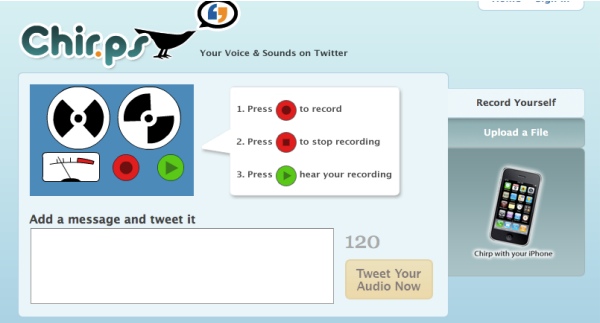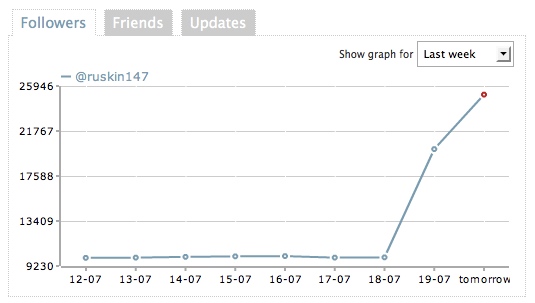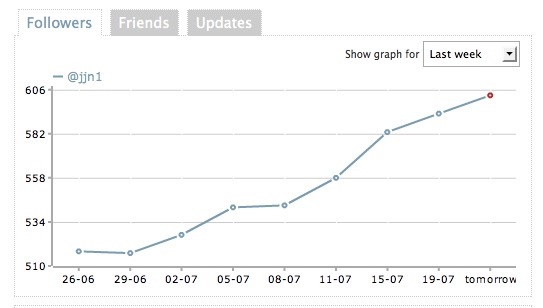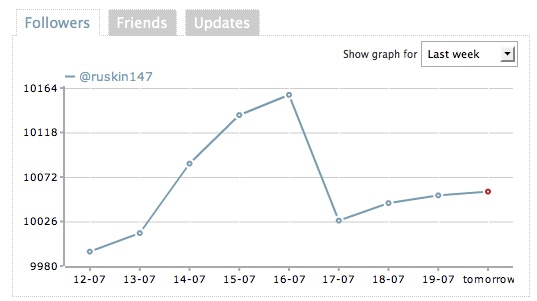Latest addition to the Twitter ecosystem. You can find it here.
Category Archives: Social Networking
Stephen Fry on the “pointless babble” report
Lovely blog post.
The clue’s in the name of the service: Twitter. It’s not called Roar, Assert, Debate or Reason, it’s called Twitter. As in the chirruping of birds. Apparently, according to Pears (the soapmakers presumably – certainly their “study” is froth and bubble) 40% of Twitter is “pointless babble”, (http://is.gd/2mKSg) which means of course that a full 60% of Twitter discourse is NOT pointless babble, which is disappointing. Very disappointing. I would have hoped 100% of Twitter was fully free of earnestness, usefulness and commercial intent. Why do these asinine reports jump onto a bandwagon they don’t understand and why do those reporting on them relate with such glee that a service that was never supposed in the first place to be more than gossipy tittle-tattle and proudly banal verbal doodling is “failing to deliver meaningful commercial or political content”. Bollocky bollocks to the lot of them. They can found their own “enterprise oriented” earnest microblogging service. Remind me to avoid it.
Precisely!
Pointless babble or something more important
Doug Clow has a thoughtful blog post sparked by a cod ‘research’ report that 40% of the stuff on Twitter is “pointless babble”.
Fundamentally, though, this study (almost) entirely misses the point of what people on Twitter experience. It sampled the Twitter public stream, which is the total assemblage of what everyone using the service is producing.
But what looks like ‘pointless babble’ isn’t pointless, if it’s from people you know or care about. It’s social grooming, it’s keeping in touch. It’s what most human conversation is about. If you think this stuff is pointless babble, you’re really not going to enjoy parties. Or indeed be likely to maintain fulfilling personal relationships. On Twitter, you get to choose whose ‘pointless babble’ you want to follow. Almost nobody who actually uses Twitter uses it by reading the public stream.
If you learn about Twitter by reading these sorts of reports, you’ll get a bizarre view that really tells you very little about what it’s like to use as a service…
I’m consistently amazed by the way people in the mainstream media and elsewhere project their fantasies onto Twitter — much as they used to do with blogs until their employers told them that they had to blog. Twitter is one of the most useful web services that I use, but that’s because it provides me with a low-intensity way of plugging into the collective IQ of colleagues, friends, acquaintances and peers. For me it’s at least as important as RSS, and that’s saying something.
Facebook, Friendfeed and, er, Google (of course)
This morning’s Observer column.
Google’s page-rank search technology is good, but it’s still pretty primitive – try looking for a hotel in rural France or a plumber in any UK town. You could say that search is about 5% solved, with 3% of that down to Google. With 95% still to do, many people think the next advances will come from adding social or collaborative dimensions to pure computational algorithms.
Which is where social networking comes in…
How to lose your job on FaceBook

Thanks to Jack Schofield for the link.
Bill Gates Dumps Facebook
From Mashable.com.
Bill Gates confessed at an event in New Delhi today that he gave up on Facebook because he couldn’t keep up with the friend requests. Gates remarked that there were “10,000 people wanting to be my friends” after he tried out the service, and it was time consuming to decide if he “knew this person, did I not know this person”.
Pity, given that he had such a promising FaceBook page.
Twitter puzzles
This tweet by Rory Cellan-Jones sent me to Twittercounter, which produced this chart:
Suggests that something strange is going on. Compare, for example, with the chart for my account, which accurately reflects data coming from email notifications from Twitter.
Hmmm… Is a spambot signing up ‘followers’ of Rory?
LATER: Now he’s back to his original track.
Which suggests that there’s something wrong with Twittercounter?
Moral: put not your faith in these statscounting services.
Shirky on Twitter and Iran
Here’s a fragment of an interesting interview.
Q: What do you make of what’s going on in Iran right now?
A: I’m always a little reticent to draw lessons from things still unfolding, but it seems pretty clear that … this is it. The big one. This is the first revolution that has been catapulted onto a global stage and transformed by social media. I’ve been thinking a lot about the Chicago demonstrations of 1968 where they chanted “the whole world is watching.” Really that wasn’t true then. But this time it’s true … and people throughout the world are not only listening but responding. They’re engaging with individual participants; they’re passing on their messages to their friends; and they’re even providing detailed instructions to enable web proxies allowing Internet access that the authorities can’t immediately censor. That kind of participation is reallly extraordinary.
Q: Which services have caused the greatest impact?
A: Blogs. Facebook. Twitter. It’s Twitter. One thing that Evan Williams and Biz Stone did absolutely right is that they made Twitter so simple and so open that it’s easier to integrate and harder to control than any other tool. At the time I’m sure it wasn’t conceived as anything other than a smart engineering choice. But it’s had global consequences. Twitter is shareable and open and participatory in a way that Facebook’s model prevents. So far, despite a massive effort, the authorities have found no way to shut it down and now there are literally thousands of people around the world who’ve made it their business to help keep it open.Q: Do you get a sense that it’s almost as if the world is figuring out live how to use Twitter in these circumstances
A: Some dissidents were using named accounts for a while and there’s been a raging debate in the community about how best to help them. Yes there’s an enormous reckoning to be had about what works and what doesn’t. There have been disagreements over whether it was dangerous to use hashtags like #Iranelection and there was a period in which people were openly tweeting the IP addresses of web proxies for people to switch to — not realizing that the authorities would soon shut these down. It’s incredibly messy, and the definitive rules of the game have yet to be written. So yes, we’re seeing the medium invent itself in real time…
The next Twitter scare
Now that the Daily Mail has latched on to Twitter, stand by for scare stories about how it is — like Google Streetview — the ‘burglar’s friend’. A starting point will be this AP story about an American couple who shared real-time details of a recent trip on Twitter. Their posts said, for example, they were “preparing to head out of town,” that they had “another 10 hours of driving ahead,” and that they “made it to Kansas City.”
While they were on the road, their home in Arizona was burgled. The chap has an online video business called with 2,000 followers on Twitter and he thinks his Twitter updates tipped the burglars off.
“My wife thinks it could be a random thing, but I just have my suspicions,” he said. “They didn’t take any of our normal consumer electronics.” They took his video editing equipment.
You have been warned!
Quote of the day
“I think Twitter’s a success for us when people stop talking about it, when we stop doing these panels and people just use it as a utility, use it like electricity. It fades into the background, something that’s just a part of communication. We put it on the same level as any communication device. So, e-mail, SMS, phone. That’s where we want to be.”
Twitter co-founder Joe Dorsey, speaking at a conference.





